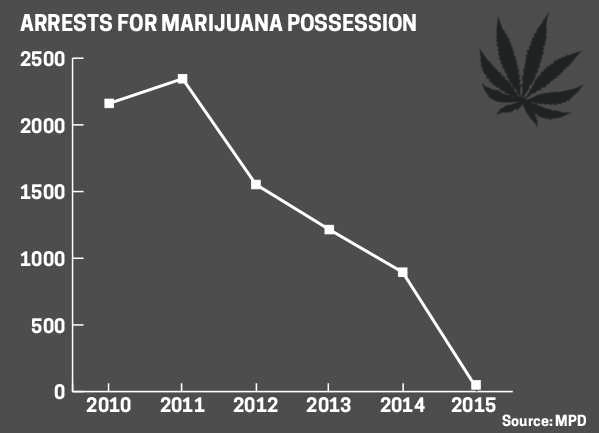Updated: Dec. 7, 2015 at 7 p.m.
The number of marijuana-related arrests in the city has dropped by about 99 percent just more than a year after marijuana was decriminalized in D.C.
There have been seven arrests for possessing more than two ounces of marijuana in D.C. this calendar year – far fewer than the nearly 900 people who were arrested for the drug in 2014, according to Metropolitan Police Department crime data. The drop, which includes data up to Nov. 6 this year, is larger than the decrease in marijuana crimes in other states like Colorado and Washington in the year following legalization.
D.C. residents voted in November 2014 to legalize possessing, growing and using small amounts of marijuana in private settings. Residents can be arrested for possessing more than two ounces of marijuana. Residents can still not sell the drug or use it in public.
But GW’s policies, which ban marijuana use and possession on campus, did not change following the city’s adjustment. The University announced that the ban would continue on campus, or GW could risk losing federal funding because of federal laws that require schools to have drug-free policies.
The number of marijuana violations on campus since the drug was legalized is “consistent” with the number of violations over the years, University spokeswoman Maralee Csellar said in an email. She declined to provide the number of marijuana violations on campus in the past years. GW’s crime log does not distinguish which drug is involved in a violation.
“Although GWPD has not instituted any new policies, we are committed to working to reduce the number of drug law violations incidents on our campuses,” she said.
Student referrals for drug and alcohol violations on campus have dropped by roughly half last year, according to crime data released this fall. There have been 28 recorded drug violations so far this semester, compared to 40 in the spring semester.
There have been 10 drug violations so far this semester at Georgetown University, one fewer violation than the university experienced the semester before, according to Georgetown’s crime log. The log also shows that in 2014, the school had 18 drug violations total.
Marijuana-related court cases in Denver decreased by 40 percent between 2010 and 2011, the year following the legalization of the drug in the state, according to a report by the Judicial Branch of Colorado. In 2014, there was only one marijuana case reported in Denver, marking a 99 percent decrease in arrests since the drug was legalized, the report shows.
Low-level marijuana court filings for violations like possession of small amounts of marijuana in Washington state dropped from about 98 percent in the year following legalization, according to a report by the Drug Policy Alliance.
Jonathan Caulkins, a drug policy expert and professor at Carnegie Mellon University, said he thinks D.C. won’t further legalize the drug until more of the country follows the trend, citing how D.C.’s budget needs congressional approval to be passed – approval that could be withheld if lawmakers don’t agree with decisions made by city leaders.
Caulkins added that other states like California and Massachusetts, where marijuana legalization will be on the ballot in 2016, would need to pass legalization laws in order to create a national trend toward legalization great enough to be able to influence D.C. drug policy.
“Unless the next president really cares about overturning that, my best guess is that then we will have crossed the threshold,” he said. “I think then more and more states are going to legalize.”
This post was updated to reflect the following correction:
The Hatchet incorrectly reported D.C. residents could be fined $25 for possessing marijuana in public. In the more recent version of the law, it is illegal to possess more than two ounces of marijuana, and using it or selling it in public is also illegal. We regret this error.







